Edie Melson's Blog, page 119
July 24, 2022
The Magic Paragraph: A Tool that Belongs in Every Writers Toolbox
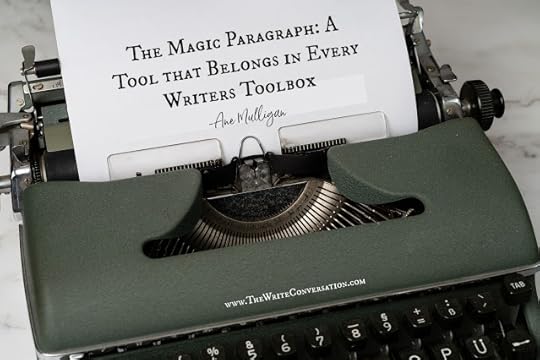
by Ane Mulligan @AneMulligan
Developed by the late Ron Benrey, the Magic Paragraph has served authors well for many years. I learned about it at the Blue Ridge Mountains Christian Writers Conference in 2003. I still rely on it. It's one of those Golden Nuggets that belongs in every writer's toolbox. When Ron passed away, his wife, Janet Benrey, gave me permission to carry on its teaching.
What is the Magic Paragraph?
This little tool, the Magic Paragraph, isn’t a formula per se. It’s a guide to showing what’s in your character’s head. It keeps the reader grounded in whose Point of View (POV). It helps ground you the author in deeper POV by step two.
So without further ado, here is The Magic Paragraph.Signal whose head to enterWrite an appropriate sense, emotion or mental facultyShow appropriate action or responseRepeat if necessary Breaking that down, the first one is fairly self-explanatory. Begin by letting the reader know whose POV.
Jane plopped her backside down on the curb.
We know we’re in Jane’s head. You don’t have to start with the name, but give it fairly soon, so the reader knows who it is. In one of my books, I started it this way:
The morning fog was about as thick as the pea soup Great-aunt Lola used to make. Claire hated that soup then and she didn’t much like this fog now.
I give you the POV character's name in the second sentence. And you wouldn’t confuse the POV character with Great-aunt Lola, because she wouldn’t think of herself or her soup in that way.
In those same two opening sentences, I have both the first and second bullets in the magic paragraph.
I signaled whose head to enter and then I recorded an appropriate sense, emotion or mental faculty for the character.
Here’s another one to follow Jane’s opening line.
Jane plopped her backside down on the curb. Her spirit was so low she could probably dangle her feet and not touch the water trickling in the gutter.
Next is to show an appropriate action.
For Claire it’s:
The morning fog was about as thick as the pea soup Great-aunt Lola used to make. Claire hated that soup then and she didn’t much like this fog now. She swished her hand back and forth in an impotent attempt to dispel it.
For Jane:
Jane plopped her backside down on the curb. Her spirit was so low she could probably dangle her feet and not touch the water trickling in the gutter. She pulled a crumpled tissue from her pocket and blew her nose, wishing she could blow away her problems as easily.
The last item is Repeat if necessary. At the very least, at the beginning of each scene. You need to keep the reader grounded in your POV character’s head. Take your reader on the journey, making them privy to your POV character’s innermost thoughts.
So there you have it, The Magic Paragraph. Use it to help keep your story and your reader grounded in your character’s POV.
Not long before he passed away, Ron wrote The Idiot's Guide To Writing Christian Fiction . The Magic Paragraph is part of the book, too.
TWEETABLEThe Magic Paragraph: A Tool that Belongs in Every Writers Toolbox from @AneMulligan on @EdieMelson (Click to Tweet)
 Ane Mulligan lives life from a director’s chair, both in theatre and at her desk, creating novels. Entranced with story by age three, at five, she saw PETER PAN onstage and was struck with a fever from which she never recovered—stage fever. One day, her passions collided, and an award-winning, bestselling novelist immerged. She believes chocolate and coffee are two of the four major food groups and lives in Sugar Hill, GA, with her artist husband and a rascally Rottweiler. Find Ane on her website, Amazon Author page, Facebook, Instagram, Pinterest, The Write Conversation,and Blue Ridge Conference Blog.
Ane Mulligan lives life from a director’s chair, both in theatre and at her desk, creating novels. Entranced with story by age three, at five, she saw PETER PAN onstage and was struck with a fever from which she never recovered—stage fever. One day, her passions collided, and an award-winning, bestselling novelist immerged. She believes chocolate and coffee are two of the four major food groups and lives in Sugar Hill, GA, with her artist husband and a rascally Rottweiler. Find Ane on her website, Amazon Author page, Facebook, Instagram, Pinterest, The Write Conversation,and Blue Ridge Conference Blog.
Published on July 24, 2022 22:00
July 23, 2022
Tips to Keep Writing When the World is Falling Apart
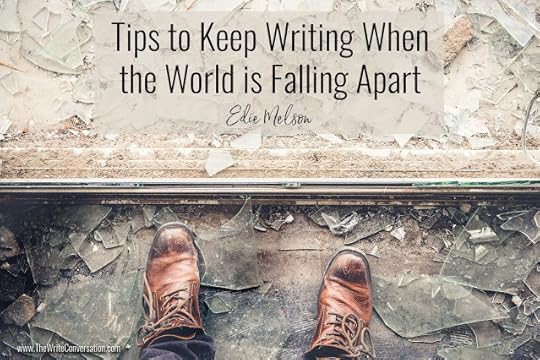
by Edie Melson @EdieMelson
If world events in the past couple of years has taught us anything, it’s that life can change in an instant. I thought I knew that, but now it’s something I’m hyper-aware of, and it’s affected the way I do life, writing life and all the rest as well.
At the beginning of all this craziness, I ascribed to the hunker-down-and-wait mentality.
I couldn’t seem to motivate myself to creativity—or much of anything else. I overdosed on news and Netflix. It made my mind and body sluggish and my mood plummeted.
My life was passive as I was waiting for things to settle and a pattern to emerge.
I had become like a certain type of heroine whom I despise. One who just waits to be rescued and lets everyone else have fun sword fighting and saving the day. Not really a picture I’m proud of.
Luckily God finally got my attention and He whispered some fairly significant truths.
God's Truth about the WorldI never was in control to begin with and this time is a reminder of that fact. For the Lord of hosts has purposed, and who will annul it? His hand is stretched out, and who will turn it back? Isaiah 14:27I was never promised a clear path with predictable outcomes. When you go through deep waters, I will be with you, When you go through rivers of difficulty, you will not drown. When you walk through the fire of oppression, you will not be burned up; the flames will not consume you. Isaiah 43:2I have been given certain gifts, situations, and communities—as well as jobs to do within them. I was never promised a specific set of circumstances with which to follow my calling. For we are his workmanship, created in Christ Jesus for good works, which God prepared beforehand, that we should walk in them. Ephesians 2:10Life is finite and I must make the most of the time I’m given. Yet you do not know what tomorrow will bring. What is your life? For you are a mist that appears for a little time and then vanishes. James 4:14God loves me and He’s never lost control. None of the craziness of life—now or later—can shake Him from the purposes He’s ordained. No, in all these things we are more than conquerors through him who loved us. For I am sure that neither death nor life, nor angels nor rulers, nor things present nor things to come, nor powers, nor height nor depth, nor anything else in all creation, will be able to separate us from the love of God in Christ Jesus our Lord. Romans 8:37-39Yeah.
That last one.
God IS still in control.
I don’t get a free pass from life just because things are difficult and different.
Where to Focus When the World Falls ApartDraw closer to God through prayer, Bible study, worship and praise. But for me it is good to be near God; I have made the Lord God my refuge, that I may tell of all your works. Psalm 73:28Exercise my gift. God has a purpose for the gifts he’s given each of us. And He wants to use our gifts to change the world. But if I’m not using them, He’ll move on and use someone. As each has received a gift, use it to serve one another, as good stewards of God's varied grace: 1 Peter 4:10Love the people God has placed in my path. To me that means more than friends and family, it means I must truly love—the difficult kind of love—those on the news who anger me, the driver who cuts me off, the grocery clerk who’s exhausted and needs a kind word. Above all, keep loving one another earnestly, since love covers a multitude of sins. 1 Peter 4:8Remember that God isn’t finished. And I am certain that God, who began the good work within you, will continue his work until it is finally finished on the day when Christ Jesus returns. Philippians 1:6 So where does this leave me as a writer in difficult times? Exactly the same place I was as a writer in easier times. And that's an important truth I'm just now embracing. My calling and my purpose haven't changed even if the world around me has. It's time to seize the day and be about the business of writing.
What about you? How are moving on with your purpose in spite of the crazy world around us.
TWEETABLETips to Keep Writing When the World is Falling Apart from @EdieMelson (Click to Tweet)
 Edie Melson is a woman of faith with ink-stained fingers observing life through the lens of her camera. No matter whether she’s talking to writers, entrepreneurs, or readers, her first advice is always “Find your voice, live your story.” As an author, blogger, and speaker she’s encouraged and challenged audiences across the country and around the world. Her numerous books reflect her passion to help others develop the strength of their God-given gifts and apply them to their lives. Connect with her on her website, through Facebook, Twitter, and Instagram.
Edie Melson is a woman of faith with ink-stained fingers observing life through the lens of her camera. No matter whether she’s talking to writers, entrepreneurs, or readers, her first advice is always “Find your voice, live your story.” As an author, blogger, and speaker she’s encouraged and challenged audiences across the country and around the world. Her numerous books reflect her passion to help others develop the strength of their God-given gifts and apply them to their lives. Connect with her on her website, through Facebook, Twitter, and Instagram.
Published on July 23, 2022 22:00
July 22, 2022
Four Crucial Insights to Help Writers Create Better Characters

by Zena Dell Lowe @ZenaDellLowe
As writers, we know that the most important part of any story is character. At the end of the day, our readers won’t care about the plot or about how cleverly your story is executed if they don’t care about who that story is happening to. It’s the characters, the characters, the characters that matter. But what makes an audience fall in love with a character, or what is it about those characters that make us so emotionally invested in them, even though we know they aren’t real? It’s because characters are better than real in several important ways.
Write Better Characters with These 4 Insights
1. We know them in a way we could never know a real person.
When things are better than real, it means they’ve surpassed the real thing. In this case, story characters are better than real people because they’re safer to emotionally invest in. Real people are dangerous. They’re always changing. We can never really be sure who they are. But we can have a certainty about our story characters that we can never have about real people in real life. We know who they are.
There’s something mystical that happens when we feel like we know someone. It produces in us some sort of involuntary emotional attachment. The more we know them, the more we can’t help but to love them, even when they’ve done bad things. This is because true knowledge necessarily includes understanding. We’re able to see WHY they do what they do. We understand their motives and all the nuances that feed their choices, which breeds empathy for their suffering.
It also breeds enjoyment. Think about it. The more we know something, the more enjoyment we derive from that thing. This means that our job is to make sure our characters are consistent. The audience must believe that the choices they make—their behavior—is consistent with the type of person they are. There’s nothing worse than reading a story and thinking, “No way. So-and-so would never do that.” We know if a character would or would not do a certain thing, because we know them. So, make your characters consistent, which will ensure that they’re knowable, which will automatically make them more accessible, more dependable, more comprehensible, and more enjoyable. At every turn, they’ll be better.
2. The lives of our characters are way more exciting.
On top of this, we live through them vicariously since their lives are clearly more interesting and exciting. Every moment in story world keeps us on the edge of our seats. Normal life isn’t like this. If it was, we would all die of heart attacks. But in story, everything that happens is either exciting right now, on the verge of being exciting, or just coming down from being exciting, and already revving up for more excitement!
The name of the game in story is to constantly keep your characters in a heightened state of conflict. Each scene must build suspense or add tension to keep everyone on edge, including us. We should never see our characters doing boring stuff unless those moments are meant to raise the tension or the stakes. If we see them sleeping, then either something happens in their dreams that takes the character into a heightened state, or something happens in the room that takes them into a heightened state. The “boring” parts must be used as a device to build suspense, otherwise you skip it. Real life is tedious, dull, and mundane. But the lives of story characters are exciting, which is why they’re better than real.
3. Characters are compressed in time.
Stories deal with a specific time frame. You must choose a particular segment of that character’s life that stands alone as relevant or important. You can’t try to fit in every single detail. Even stories about true historical figures don’t try to cram in every aspect of that person’s existence. If they did, the story would be all over the place. It wouldn’t even make sense. Their lives are just too big to try to include every single event. So, we select one event -- one particular time frame -- that we’re going to milk for everything it’s worth. A specific season of life with a clear beginning, middle, and end.
4. Their lives are vetted for our entertainment.
We also filter out anything that isn’t relevant or necessary to the story. There’s nothing superfluous or unneeded. The selection of details must fit the story you’re telling, which gives us a sense of order, as opposed to the messiness of real life.
Furthermore, the heart of every story is a personal paradox. There’s nothing new under the sun. But since it’s the person the story is happening to that matters, the details matter more. The details are what make those characters real to us. They’re what excite us and draw us in. We connect more deeply when the ideas are specific and precise. We don’t connect deeply when stories are communicated in bland, generic terms, or when the language or mythology is vague or ambiguous. You want to paint a picture that’s vivid and specific, and choose the parts of their lives that matter, rather than selecting random details that don’t play into the narrative. The details you choose will help the audience create a better picture in their mind’s eye and will make the story come alive to your audience.
Yes, characters are constructed. No, they don’t really exist. But when you create great characters, they’ll feel real to the audience, and more importantly, they’ll be better than real. Start with the principles we’ve laid out here, and you’ll be well on your way to creating better characters for your stories.
TWEETABLEFour Crucial Insights to Help Writers Create Better Characters, tips from @ZenaDellLowe on @EdieMelson (Click to Tweet)
 Zena has worked professionally in the entertainment industry for over 20 years as a writer, producer, director, actress, and story consultant. Zena also teaches advanced classes on writing all over the country. As a writer, Zena has won numerous awards for her work. She also has several feature film projects in development through her independent production company, Mission Ranch Films. In addition to her work as a filmmaker, Zena launched The Storyteller’s Mission with Zena Dell Lowe, a podcast designed to serve the whole artist, not just focus on craft. In 2021, Zena launched The Storyteller’s Mission Online Platform, where she offers advanced classes and other key services to writers. Zena loves story and loves to support storytellers. Her passion is to equip artists of all levels to achieve excellence at their craft, so that they will truly have everything they need to change the world for the better through story.
Zena has worked professionally in the entertainment industry for over 20 years as a writer, producer, director, actress, and story consultant. Zena also teaches advanced classes on writing all over the country. As a writer, Zena has won numerous awards for her work. She also has several feature film projects in development through her independent production company, Mission Ranch Films. In addition to her work as a filmmaker, Zena launched The Storyteller’s Mission with Zena Dell Lowe, a podcast designed to serve the whole artist, not just focus on craft. In 2021, Zena launched The Storyteller’s Mission Online Platform, where she offers advanced classes and other key services to writers. Zena loves story and loves to support storytellers. Her passion is to equip artists of all levels to achieve excellence at their craft, so that they will truly have everything they need to change the world for the better through story.To find out more about Zena or her current courses and projects, check out her websites at WWW.MISSIONRANCHFILMS.COM and WWW.THESTORYTELLERSMISSION.COM
Published on July 22, 2022 22:00
July 21, 2022
What to do When Your Writing Doesn't Bear Fruit
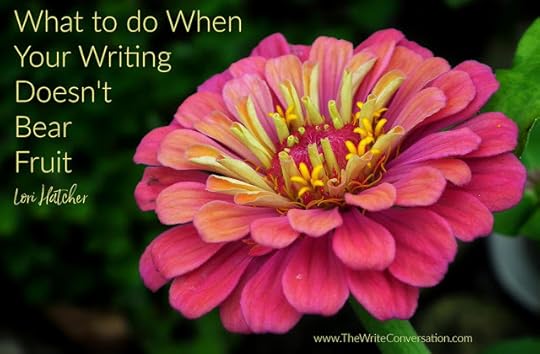
by Lori Hatcher @LoriHatcher2
If You Can’t Grow Tomatoes, Plant Zinnias
For years I tried to grow tomatoes. I planted them on the north side of my garden. I planted them on the south side. I planted them in pots. I even planted them along the fence line where my neighbor’s sprinkler would water them, with no success.
I’d begin each season excited and hopeful, and by July I’d be ripping out stunted, diseased, fruitless plants.
I expressed my frustration to one of my dental patients as we waited for the dentist to check his teeth.
“I’m giving up on tomatoes. I can’t afford to water them, and we don’t get enough rain for them to thrive. Every year I get my hopes up, and every year I’m disappointed.”
“Why don’t you plant zinnias?” he said.
“Zinnias?”
“Yes, zinnias. You can’t eat ‘em, but they’re beautiful. They love the sun and can hold up under the heat. And they don’t require much water.”
The next spring, I bought a packet of seeds, prepared the soil, and planted. Soon, tiny seedlings pushed through the ground. Before I could say, “Dead tomato,” they blossomed into a multi-colored patch of joy.
I picked bunches, shared them, and saved some seeds for the next year. When spring came, I ignored the tomato seedlings at the garden center and planted an even bigger patch of zinnias. This year, the colorful flowers fill my entire garden. I tuck them into mason jars and give them to friends and neighbors, anyone who needs a smile.
If you’ve read this far, you’re probably wondering, what in the world does this have to do with writing?
Everything.
My writing career began in journalism. I wrote feature articles for a local newspaper and later a regional magazine. When those avenues of publication dried up, I submitted Christian living articles to online and print publications. The pandemic caused several of my most reliable places of publication to go under, so I explored other options.
One summer I wrote blog content for businesses and websites. I wrote pet sympathy cards for a greeting card line. Then I graduated to writing copy for human greeting cards (smile). When those opportunities ended, I researched something different. (Google is a wonderful thing. Check out this article about paid writing opportunities .)
As my patient suggested when my tomato crop failed, I took the skills and desire God gave me and redirected it. Instead of planting tomatoes, I planted zinnias. When I did, I learned new skills, made great writing connections, and added to my writing resume.
Perhaps you’re enjoying a bumper crop of writing fruit right now. I’m so glad. If you’re struggling, or if you haven’t yet found your writing sweet spot, why not set the tomatoes aside and plant zinnias? Or marigolds? Or Blue Lake pole beans?
You may find a change is just what you need to bear greater fruit in your writing journey.
Now it’s your turn. Do you have a story about how a writing “redirection” opened up a new area of writing?
TWEETABLEWhat to do When Your Writing Doesn't Bear Fruit, tips from @LoriHatcher2 on @EdieMelson (Click to Tweet)
 Lori Hatcher is an author, blogger, writing instructor, women’s ministry speaker, and career dental hygienist. She writes for Our Daily Bread, Guideposts, Revive Our Hearts, and Crosswalk.com. Lori’s latest devotional, Refresh Your Prayers, Uncommon Devotions to Restore Power and Praise, released March 1 with Our Daily Bread Publishing. Connect with her at www.LoriHatcher.com or on Facebook, Twitter(@lorihatcher2) or Pinterest (Hungry for God).
Lori Hatcher is an author, blogger, writing instructor, women’s ministry speaker, and career dental hygienist. She writes for Our Daily Bread, Guideposts, Revive Our Hearts, and Crosswalk.com. Lori’s latest devotional, Refresh Your Prayers, Uncommon Devotions to Restore Power and Praise, released March 1 with Our Daily Bread Publishing. Connect with her at www.LoriHatcher.com or on Facebook, Twitter(@lorihatcher2) or Pinterest (Hungry for God).
Published on July 21, 2022 22:00
July 20, 2022
Organize Your Writing Life with These 7 Tips

by Edie Melson @EdieMelson
I don’t care if you’re a freelance writer, nonfiction writer, novelists or something of a hybrid. The truth is that you have to wear a lot of hats to find publishing success. You have to be able to write on a deadline, plan marketing campaigns, utilize social media, and of course, write.The increase pressure to do it all has led to frustration and burnout in a lot of writers I come into contact with. But even with the downside, there are those of us to whom writing is like breathing. Without it, we’ll die.
We have come to a point the mad juggling skills are a requirement for today’s writers. But don’t give up hope. There are some things you can do, some ways to organize your time, that will help you accomplish more than you thought. Beyond that, you can make a conscious decision to give yourself a pass on some things.
Tips that keep me a sane writer:
1. I Make a List. Now I have to confess, I’m not a rabid list maker. I’m just the opposite. Lists make me feel pressured—at least they used to. But I have learned that lists can be my best friend. Because truthfully, I just cannot keep up with everything in my head. Not every list is a to-do list. Many of them are reference lists. Here are some ongoing lists I keep:Blog post schedules. I write a lot of blog posts for my site, and also for other sites. I have a second Tuesday here, and a fourth Friday there, mixed in with a first Sunday on another site. Believe me, the list goes on. I have developed an ongoing list of the due date of every blog post I owe someone—including myself. Due date list. This can be due dates for articles, books, edits, even my own self-imposed goals.Submission list. If you do a good bit of freelance writing, this one’s a must. It’s also important if you’re submitting queries or proposals to agents, looking for representation.Special events list. Each event gets its own list. If I have a book signing, or a book launch, or I’m promoting a conference, I have a list for that. I include a goal of what I’d like to accomplish. Then I map out things I want to do to help me achieve that goal.Social media list. I keep an ongoing list of websites and blogs that I check regularly for possible social media updates. This is where I get a lot of the Tweets and FB posts that I share.Idea lists. Yes lists. I keep ongoing tickler files on blog post ideas, article ideas, book ideas, book launch ideas, etc. 2. I Set Goals. I’ve learned that I don’t get very far down the road when I don’t know where I’m going. So I have goals. I know where I want to be in 3 months, 6 months, 1 year, 5 years, etc. These incremental goals are mandatory for me. Even if I don’t have an official contract with a deadline, I work better when I have a plan.
3. I Take a Sabbath—if you’ll forgive the pun—religiously. I’ve learned, the hard way, that I’m no good to anyone if I don’t get a regular, weekly time off.
4. I Look at the Year Ahead. This is one that has helped me a lot. I look at the things I know I have upcoming—about a year in advance—and use that to plan ahead. If I have a book releasing in September, then I know August, September, October and November are going to be heavy marketing months. I co-direct the Blue Ridge Mountains Christian Writers Conference in May of each year, so I do my best not to take any out-of-town speaking engagements or deadlines that month. Sometimes it doesn’t work that way, but I try to control what I can.
5. I Ask for Prayer Support. I was messaging back and forth with a writer today who is on an almost impossible deadline. She was asking for suggestions that would help her succeed. One of the first things I told her to do was to call in the prayer support. Ladies and gentlemen, we are on the front lines in today’s society. Words have power and when we wield that power for good, we can expect to encounter resistance. So often writers tell me they’re hesitant to ask non-writer friends for prayer support. They feel like their writing is unimportant. I say POPPYCOCK! I also recommend you have a group or team that prays regularly for you.
6. I Remain Accountable. This is another biggie for me. If I don’t have someone who is expecting me to report back to them, I can let things slide. I have someone I exchange texts with daily, for prayer and accountability. I also have a group of writers online that I’m accountable to, as well as a couple of local writers I meet with regularly.
7. I Ask for Help. I have an ongoing agreement with several writers. We can borrow blog posts from each other without first asking permission. This means that at 2am, when I wake up in a cold sweat because I forgot to write a blog post, I can visit one of their sites and voilà a guest post. I always link back to the site where I got the post, and include a bio. Believe me, this arrangement has saved several us on several occasions.
These are the things that I do to juggle the things necessary to succeed. What would you add to the list? Be sure to leave your tips in the comments section below.
Don’t forget to join the conversation!Blessings,Edie
TWEETABLEOrganize Your Writing Life with These 7 Tips from @EdieMelson (Click to Tweet)
 Edie Melson is a woman of faith with ink-stained fingers observing life through the lens of her camera. No matter whether she’s talking to writers, entrepreneurs, or readers, her first advice is always “Find your voice, live your story.” As an author, blogger, and speaker she’s encouraged and challenged audiences across the country and around the world. Her numerous books reflect her passion to help others develop the strength of their God-given gifts and apply them to their lives. Connect with her on her website, through Facebook, Twitter, and Instagram.
Edie Melson is a woman of faith with ink-stained fingers observing life through the lens of her camera. No matter whether she’s talking to writers, entrepreneurs, or readers, her first advice is always “Find your voice, live your story.” As an author, blogger, and speaker she’s encouraged and challenged audiences across the country and around the world. Her numerous books reflect her passion to help others develop the strength of their God-given gifts and apply them to their lives. Connect with her on her website, through Facebook, Twitter, and Instagram. A Fun Image to Share on Pinterest!

Published on July 20, 2022 22:00
July 19, 2022
Being Busy Can Become a Toxic Trap for Writers
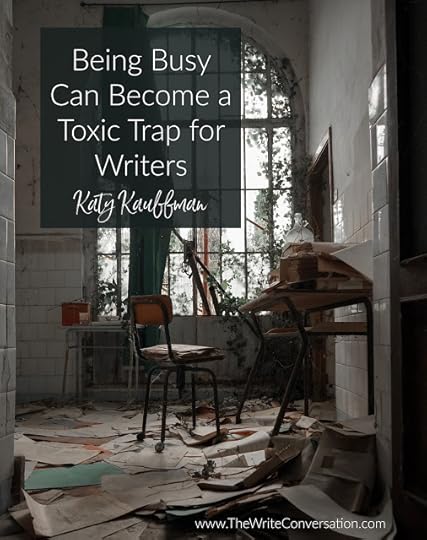
by Katy Kauffman @KatyKauffman28
I dreaded Januarys when I was a kid. Gray, cold, and slow. Not much to do. After coming off the thrill of Christmas with its church pageants, parties, Christmas shopping, and seeing family, I wished January would speed by.
Now that I’m in publishing, I crave January. It’s still the slowest month of the year, but it gives me a breather. A chance to catch up on a project or start a new one. In one particular January, I took a course on building WordPress websites, and this month our new site, LightHouse Bible Studies is done!
I have a tendency to stuff a slower period with more things. Do you?
The thrill of “busy” may drive us to cram our schedules with one more thing. And one more. And one more. After all, we may enjoy writing assignments and book projects and helping people and traveling and volunteering at church. None of these are bad, but how much we say yes to, can turn the thrill of having fun things to do into a toxic drain on our energy, focus, joy, or health.
Recently, I pictured taking the “sting” out of stress—taking the “demand” out of “it has to be done now.” Or “you aren’t doing enough.” Or “why can’t you answer those emails faster?” Or even “hurry, hurry to the post office before it closes.” When we place unrealistic expectations on our to-do list, eventually it catches up with us.
And then our Lord whispers, Come to Me, all you who labor and are heavy laden, and I will give you rest (Matthew 11:28 NKJV).
“But, Lord, I am supposed to be doing all these wonderful things. Right?”
For My yoke is easy and My burden is light (Matthew 11:30).
“My schedule is anything but light, Lord. I remember how busy You were when You were here. What was Your secret?”
Now in the morning, having risen a long while before daylight, He went out and departed to a solitary place; and there He prayed (Mark 1:35).
Time with the Father.
Of course.
When we push ourselves too much, it’s time to sit down with God and ask Him for His wisdom and perspective. What does He want us to focus on right now? What can wait?
I’ve been surprised when God has added yet another layer of work to my already busy schedule. But this year, I know better what to do. Here are four keys to handling “busy” and running your schedule instead of it running you.
4 Keys to Creating a Schedule a Writer Can Actually Keep
1. Never sacrifice personal time with God for a to-do list.
It’s this time with God that refreshes our hearts, teaches us about life with Him, and lays out the priorities of the day. We can ask Him what to tackle and how to order our time, and He will give us the grace to stick with the plan or show us how to handle surprises that alter it. More than anything, we can fellowship with Him, listen to Him teach us, and share our hearts with Him.
2. Pace yourself, and build “buffers” into your promises.
I’ve known to do this for years, but now I really want to. We can pace our projects so we run them instead of them running us. We can work ahead on deadlines—three weeks ahead is a good idea. We can spread out when we work on a major project so we can do normal life and tend to the relationships we treasure. We can add a buffer of six weeks to the promise of a finished manuscript or add two weeks (if possible) to reviewing edits.
When we tell someone we’ll deliver something, we want to move mountains to get it done. But sometimes, the mountains are hard to climb and God may have a “detour” planned ahead. I’ve discovered though that a delay on finishing a project actually yields a better result because of the extra time I had to give it my best. Or I needed to live a bit more of life and gain a bit more wisdom.
3. Operate from a sense of “with.”
Write for God and with God. When I remember I am writing for Him and I take the time to study Scripture with Him, peace replaces anxiety. When we operate from a connection to God, we can have joy as we write and research. And our readers gain greater blessings than if we tried to write on our own.
4. Make time for “happy.”
I find my happy in time with family and friends, in watching butterflies visit my garden, and in drawing flowers or painting landscapes. Where do you find your happy?
Carve out time to take a breather, and do something that doesn’t require a lot of intense brain power. Doing something relaxing or creative takes the “intense” out of a busy schedule.
How do you try to manage stress and a busy schedule? Tell us in the comments. This will be a conversation we all need!
TWEETABLEBeing Busy Can Become a Toxic Trap for Writers, tips from @KatyKauffman28 on @EdieMelson (Click to Tweet)
 Katy Kauffman is an award-winning author, an editor of Refresh Bible Study Magazine, and a co-founder of LIGHTHOUSE BIBLE STUDIES. She loves connecting with writers and working alongside them in compilations, such as Feed Your Soul with the Word of God, Collection 1 which is a 2020 Selah Awards finalist.
Katy Kauffman is an award-winning author, an editor of Refresh Bible Study Magazine, and a co-founder of LIGHTHOUSE BIBLE STUDIES. She loves connecting with writers and working alongside them in compilations, such as Feed Your Soul with the Word of God, Collection 1 which is a 2020 Selah Awards finalist.In addition to online magazines, Katy’s writing can be found at CBN.COM, thoughts-about-God.com, and three blogs on writing. She loves to spend time with family and friends, talk about art and crafts in her group MY ARTSY TRIBE, and tend the garden in the morning sun. She makes her home in a cozy suburb of Atlanta, Georgia. Connect with on FACEBOOK and TWITTER.
Here's a Fun Image to Share on Pinterest!

Featured Image: Photo by eleonora on Unsplash
Published on July 19, 2022 22:00
July 18, 2022
Use These Five Ways to be an Encouragement to Other Writers

by Lucinda Secrest McDowell @LucindaSMcDowel
I just returned from serving as faculty at a favorite conference for writers and speakers. Doing what I love the most.
Encouraging others.
Friend, did you know it takes so little to speak so much into someone else’s life? Today, I’m going to break it down into small, simple steps all of us can take. Because no matter where we are in our own experience as a writer and speaker, there is always someone who could use our encouragement.
5 Ways to Encourage Other Writers
1. SHOW UP
This can mean any number of things – going to at least one writer/speaker event as an attendee or volunteer or invited faculty. It can mean joining a local critique group or even starting one in your community. It might be responding to that person who once said to you, “I want to be a writer too, but I don’t know where to begin.” Show up, not necessarily as an expert in the field (even though you may be,) but as a fellow traveler on this wild journey. Be there for someone today.
2. LISTEN
And then, do one of the hardest things of all for professional communicators – Listen. Hear their heart, their vision, their hopes. Ask good questions that will prompt them to clarify the next steps. “What do you consider your personal expertise?” “What hard lesson do you hope to share with others?” “What are some of your own personal stories that reveal the intersect between God’s Word and practical life?” Don’t respond too quickly with feedback but ask God to reveal more about that person and how you can help.
3. BRAINSTORM
After a season of listening, offer to brainstorm ideas and words and titles and outlines with them. Always with pen and paper, a whiteboard, or easel. If they want to plan a 3-part retreat series on emotional healing, join them in coming up with powerful words that might be included. Both with speaking events, and even a book proposal, it helps to have an outline. Play around with alliteration and 3 key sessions or 8 key steps/chapters. Target special biblical characters or scripture to unpack in the teaching portion. Two brains are better than one and it’s always encouraging to have someone with whom to bounce off ideas.
4. INTRODUCE
One of the most encouraging things we can do for another person is to introduce her to our people. Whether that be another writer friend, a fellow faculty member, an agent, publisher, or even an online group she might be interested in joining. Please don’t be selfish or threatened by widening someone else’s circle. There is room for all of us at the table. And, when we deliberately connect people with one another, God does amazing things for us as well as them. Remember, we all probably know someone else who might also pour into her life. I call this the stewardship of good friends.
5. BLESS
Yes, you read that correctly. We all have the power to bless another person. To ask God prayerfully (through His Spirit) to give insight into the gifts and future He has for them, and then to use well-chosen words to speak into their life. Words that remind others of God’s promises and power; words that comfort others with God’s unconditional love. Words that encourage others to live their unique story with God as the divine Author. Be attentive. Pray for the Holy Spirit’s insight and direction. Then pray over them and promise to follow up later.
I have been the recipient of much encouragement over the years and my prayer is to be a vessel of encouragement to others for the rest of my days. Don’t be overwhelmed by the task, just try one of these today. And one tomorrow. I’m behind you all the way.
TWEETABLEUse These Five Ways to be an Encouragement to Other Writers, tips from @LucindaSMcDowel on @EdieMelson (Click to Tweet)
 Lucinda Secrest McDowell, M.T.S., is a storyteller and seasoned mentor who engages both heart and mind while “Helping You Choose a Life of Serenity & Strength.” A graduate of Gordon-Conwell Theological Seminary and Furman University, McDowell is the author of 17 books and contributing author to 36+ books. Her award-winning books include Soul Strong, Life-Giving Choices, Dwelling Places, and The Courage to Write. Lucinda, a member of the Redbud Writers Guild and AWSA, received Mt. Hermon “Writer of the Year” award and guest blogs monthly for ‘The Write Conversation.’
Lucinda Secrest McDowell, M.T.S., is a storyteller and seasoned mentor who engages both heart and mind while “Helping You Choose a Life of Serenity & Strength.” A graduate of Gordon-Conwell Theological Seminary and Furman University, McDowell is the author of 17 books and contributing author to 36+ books. Her award-winning books include Soul Strong, Life-Giving Choices, Dwelling Places, and The Courage to Write. Lucinda, a member of the Redbud Writers Guild and AWSA, received Mt. Hermon “Writer of the Year” award and guest blogs monthly for ‘The Write Conversation.’ Whether pouring into young mamas, leading a restorative day of prayer, or coaching writers and speakers through “Encouraging Words Consulting,” she is energized by investing in people of all ages. As a communications teacher, she co-directs “reNEW – spiritual retreat for writers & speakers” and has served on the faculty of Speak Up Conference, Mount Hermon Christian Writers Conference, Blue Ridge Mountains Christian Writers Conference, Florida Christian Writers Conference, Asheville Christian Writers Conference, and She Writes for Him. Known for her ability to convey deep truth in practical and winsome ways, McDowell shares words from “Sunnyside” cottage in New England and blogs weekly at WWW.LUCINDASECRESTMCDOWELL.COM
Here's a Fun Image to Share on Pinterest!

Featured Image: Photo by DISRUPTIVO on Unsplash
Published on July 18, 2022 22:00
July 17, 2022
Beneficial Author Relationships: Why We Need One Another
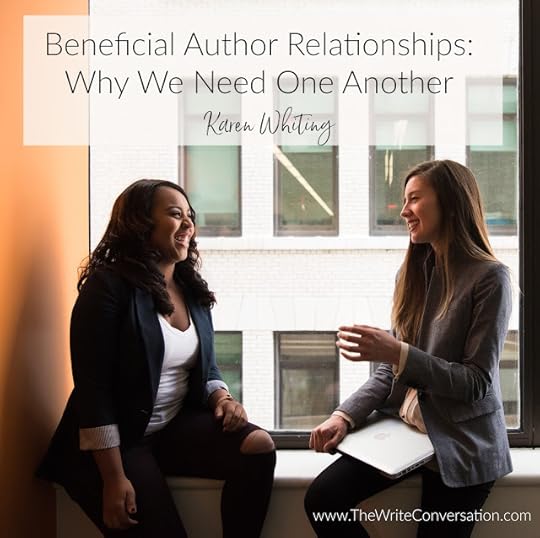
by Karen Whiting @KarenHWhiting
Getting to know and interact with other authors helps us to grow as writers, share opportunities, and build a support network. At my first large writer’s conference I met another novice writer, and we shared our ideas and hope. He later landed a contract and then connected me to his editor who wanted books for my area, families, and I got a contract.
I also connected with local authors to form a critique group that not only polished our writing, but we shared writing opportunities we learned about and that increased everyone’s writing credits. I belong to a master mind group of authors currently that provides accountability and helps us think wider and market in new directions. Connecting with other authors is inspiring, helpful, and allows us to support one another.
The Power of Author Friends
From sharing difficulties, successes, to new methods and technology, we tap into the power of the writing community. Authors listen to works-in-progress and ideas to bring insight. Authors celebrate successes and commiserate over rejections. They get one another and that helps writers continue the journey. Consider the writing friends you’ve made, and which ones are the most beneficial currently. Figure out how you are contributing to those relationships to keep the connection healthy and strong. Be sure to show you appreciate each one.
Helping Other Writers
Even novice writers can help other writers by doing reviews, being beta readers, and sharing about books they’ve read. As you become more experienced, you can also give back more with feedback, encouragement, and share writing and marketing ideas. Consider ways to help other writers:Keep informed about the industry and share opportunities with other writers of where to submit manuscripts and proposals, or media outlets for interviews.Be part of a launch team to spread the word about a book where you can also glean new ideas on marketing your own upcoming releases.Set up times to practice pitches on one another.Join writer groups or events where you can encourage one another.Share about other writers and their books and events. Promote their books at the right season, such as books for moms before Mother’s Day.Connecting with Successful Writers
Writers with publishing credits and marketing success you’d like to experience are great people to get to know. You will tap into a great resource and wealth of knowledge. These people may be very busy with numerous deadlines, so be patient in developing such connections. Start by reading their books and following them online. Post comments and meet up at a conference where the author will speak. If the author is local, offer to meet up and buy them lunch, coffee, or tea. Listen to their wisdom and ask about how he or she got started. One of my first successful friends lived nearby and I invited her to dinner as a neighbor before I knew she wrote. We became walking partners, and her advice made a huge difference in my writing journey.
Some great authors are so generous! My friends Pam Farrel, Michelle Medlock Adams, and Julie Lavender are authors I know who truly support other writers the most. They are always sharing posts and posting about author friends, new releases, and book sightings! They also share how they market and model what they do. Following such people can remind you to share posts, congratulate those doing well, and celebrate success. If you are generous with your helping other authors, then many will respond and share your news too.
Build Your Author Network
Start locally and follow writers online. One local group I belong to hosts an annual book event in conjunction with an art show and a small writer’s conference. These are events to learn, teach, sell, and connect. Attending events and writer conferences opens doors to many new author friendships.
Collect business cards to recall people you meet. Once you have a card add a note about why that person is important. Scan the cards with an app like Camcard.com to keep them handy and create groups. Add people to the groups to make them easier to find.
Keep in contact with authors and follow them on social media. Place those authors into a fried list if the social media has such an option. Spend time weekly to read posts of author friends and post comments. If you plan to attend an event, schedule time with friends who will also attend.
Be open to meeting authors. At the post office this week, the postal worker asked about my writing and then pointed out another writer who entered. I greeted the woman and gave her my card. She mentioned a fiction writer’s group and when I mentioned I write NF, she added that their group includes many genres including NF, and invited me to visit.
Mutually Beneficial
We need community and one another in many ways. In good relationships, everyone gains. The practical gains include:KnowledgeTrainingFeedbackWider reachCross marketingValuable resourcesOpportunitiesEmotional gains include:FriendshipAccountabilityMotivationEncouragementInspirationSupportIt’s nice to build a strong network of writers. Great author relationships help each person grow.
TWEETABLEBeneficial Author Relationships: Why We Need One Another - insight from author @KarenHWhiting on @EdieMelson (Click to Tweet)
Don't Miss the Other Post in this Series:Increase Marketing by Building Publishing Relationships Beneficial Author Relationships: Why We Need One Another
 Karen Whiting (WWW.KARENWHITING.COM) is an international speaker, former television host of Puppets on Parade, certified writing and marketing coach, and award-winning author of twenty-seven books for women, children, and families. Her newest book, The Gift of Bread: Recipes for the Heart and the Table reflects her passion for bread and growing up helping at her grandparent’s restaurant. Check out her newest book Growing a Mother’s Heart: Devotions of Faith, Hope, and Love from Mothers Past, Present, and Future. It's full of heartwarming and teary-eyed stories of moms.
Karen Whiting (WWW.KARENWHITING.COM) is an international speaker, former television host of Puppets on Parade, certified writing and marketing coach, and award-winning author of twenty-seven books for women, children, and families. Her newest book, The Gift of Bread: Recipes for the Heart and the Table reflects her passion for bread and growing up helping at her grandparent’s restaurant. Check out her newest book Growing a Mother’s Heart: Devotions of Faith, Hope, and Love from Mothers Past, Present, and Future. It's full of heartwarming and teary-eyed stories of moms.Karen has a heart to grow tomorrow’s wholesome families today. She has written more than eight hundred articles for more than sixty publications and loves to let creativity splash over the pages of what she writes. She writes for Crosswalk. Connect with Karen on Twitter @KarenHWhiting Pinterest KarenWhiting FB KarenHWhiting.
Published on July 17, 2022 22:00
July 16, 2022
Writers Need to Engage these Three Ways

by Tammy Karasek @TickledPinkTam
Writer, are you engaged? No, I’m not talking about wearing new shiny bling on your left hand. I’m referring to engagement related to your writing. Stick with me, here. I have three questions regarding three R’s of writing, and then I’ll explain what I mean.
3 Questions to Ensure Writer Engagement
Question One
Are you engaged with your readers? If you are writing on your website blog, sending a newsletter and have social media accounts where your readers can find you—do you regularly go back to check for comments and/or questions?
If your answer is no, you’re missing out on a great opportunity. To be engaged with your readers in essence is to build relationship. And relationship builds your reader’s desire to stay connected to you and your work. From that, relationship builds a platform of—wait for it—engaged fans. As writers, that’s what we want. We desire people who enjoy our work and want to stick around for other books we will write in the future. We can use this to challenge us to write better and keep persevering.
As a reader myself, I love seeing an author jump in and respond to others’ comments as well as my own. When they write a blog post, newsletter or make an Instagram story and share what’s on their minds or teach us a tidbit this can encourage us as writers to keep doing the thing … sitting at the keyboard sharing what the Lord lays on our hearts. Don’t you love that?
Question Two
Are you engaged as a writer in what you’re writing about? Have your done your research, or are you slacking? Be engaged with the topic. Know the terms and not just how to spell them. Be confident you could explain or describe the word or terms you’re using.
For example, my current work in progress has a strong cooking and chef element throughout the book series. I could watch a couple cooking shows and count the many years I’ve cooked supper for my family and write away. However, those of us who’ve actually graduated from a cooking school (I really did), flip out of our chairs as we watch some of those TV shows and their hosts give poor instruction or information. I’ve watched a couple shows or You Tube Videos of several popular social media folks and their knife skills are scary. It’s not scary like I’d do that so much better it’s a basic oh my goodness, she’s going to cut her finger off holding that knife or tool like that kind of scary.
Can you imagine a Criminal Investigator reading a book and shaking his/her head thinking we never do it that way, too dangerous for both the criminal and ourselves? The writer may think binge watching a couple seasons of Chicago PD could fill their repertoire of terms and ideas. However, not only true detectives would catch those faux pas, but readers are pretty savvy as well. Don’t try to fool them.
We’ve heard over and over use Deep POV, but what if we add to that use Deep POR or Deep Power of Research. Do your homework and do it well.
Question Three
Are you engaged within your writing community? Being in connection with other writers through the different opportunities of critique groups, mastermind groups, craft partners and even conferences are great examples of walking this journey alongside other writers. They also get what it takes to be a writer and can help with brainstorming, accountability and encouragement. Likewise, when you’re engaged in this type of connection, you have the ability to give back as well.
In summary, are you engaged in the three R’s of writing?
1. Readers
2. Research
3. (w)Riters —hey, it sounds like an R! (Wink)
I do hope that you are.
I’d love for you to Respond to this post and share with all of us your thoughts on engagement as a writer.
TWEETABLEWriters Need to Engage these Three Ways, tips from @TickledPinkTam on @EdieMelson (Click to Tweet)
 Tammy Karasek uses humor and wit to bring joy and hope to every aspect in life. Her past, filled with bullying and criticism from family, drives her passion to encourage and inspire others and give them The Reason to smile. She’s gone from down and defeated to living a “Tickled Pink” life as she believes there’s always a giggle wanting to come out!
Tammy Karasek uses humor and wit to bring joy and hope to every aspect in life. Her past, filled with bullying and criticism from family, drives her passion to encourage and inspire others and give them The Reason to smile. She’s gone from down and defeated to living a “Tickled Pink” life as she believes there’s always a giggle wanting to come out! She’s the Social Media Manager for the Blue Ridge Mountains Christian Writers Conference, Founding President and current Vice-President of ACFW Upstate SC, Founding President of Word Weavers Upstate SC. She’s a writing team member for The Write Conversation Blog, Novel Academy, and MBT Monday Devotions and others. Her work was published in a Divine Moments Compilation Book—Cool-inary Moments. When not writing Women’s Fiction and Rom-Com, she’s The Launch Team Geek helping authors launch their books and a Virtual Assistant for authors.
Featured Image: Photo by Hannah Wei on Unsplash
Published on July 16, 2022 22:00
July 15, 2022
Writing Characters that Matter to Our Readers
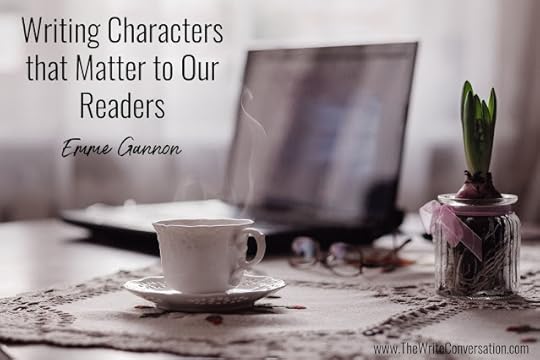
by Emme Gannon @GannonEmme
It isn’t often that we read a novel where the characters are so three-dimensional that while we inwardly scorn some of them for their impertinence, they have the power to turn back at us and eerily point their finger as if to say, I see in you what you see in me. For me, the late Rosamunde Pilcher’s 1987 split-time fiction, The Shell Seekers , had that affect.
The Shell Seekers is one of Ms. Pilcher’s most famous best sellers. It was nominated in 2003 as one of the top 100 novels in the BBC’s Big Read. The book sold more than five million copies worldwide and was adapted for the stage and twice for a television film.
Well-written stories like The Shell Seekers so capture our imagination that our days revolve around staging time to return once again to the character’s lives. At last we realize the reason for the magnetic pull. Parts of the characters that we loathe jump from the page and reveal traits hidden in us. Like a phantom ghost, they had not been seen. Until now.
The Shell Seekers is a family saga that tells the story of Penelope Keeling as she reflects on her life and her relationship with her adult children. As an older woman, she desires to be independent but when she is confronted with her own mortality by a health scare, she longs to visit the seaside village of Porthkerris in Cornwell, where she had lived with her artist father and French mother during World War II. She asks her three children to accompany her on this nostalgic journey but they all have excuses why they cannot go. When it looks as though Penelope’s quest is lost, two young friends agree to accompany her on her journey, changing the lives of them all.
Each of the characters in Penelope’s life tells their own story in their POV, allowing the reader to see the layers of their personalities and character and how their story intertwines into the tapestry of Penelope’s life.
It is there in the chapter of each character’s story that we have the opportunity to find pieces of ourselves: Nancy’s greed, Noel’s selfishness, Olivia’s tough but vulnerable nature. All those characteristics that often underlie the feeble excuses we give for being unable to step outside of ourselves and give love to another. It’s boldly there for us to see. By now, we are so connected to these alter egos of ourselves that we cannot separate from them. We must read to see if there’s hope for them and for us.
The Shell Seekers addresses the intense and often misunderstood relationship between a mother and her children and Penelope’s brave decision to let go of the burden of changing hearts that would not be changed. Instead, she decides to go back to Cornwell, a place where her parent’s love and support provided the unconditional love she now so longed for. Perhaps there she will discover how to re-connect the pieces of her broken heart.
Each time I read The Shell Seekers, I feel empowered, not so much by how the characters react to the challenges of life, but by the question that lingers when the book is closed. What would have happened if some of the characters had not given into their selfish desires. Their story is told. Ours is not. There’s hope. We were able to see a part of ourselves in the fragmented mirror of Penelope’s children, as well as the young couple who reached out to help bring Penelope’s dream to fruition. Tomorrow is a new day. We have the wonderful opportunity to choose life and love where bits of selfishness and greed once darkened our soul.
Books like The Shell Seekers, with characters that clash against the main character’s driving desire to love and be loved, are stories that touch all of us who allow ourselves to be absorbed in a story world. The power of story changes lives. That is our challenge as writers.
TWEETABLEWriting Characters that Matter to Our Readers, insight from @GannonEmme on @EdieMelson (Click to Tweet)
 Emme Gannon is a wife, mother, and grandmother who loves to write stories that stir the heart. Her award-winning writing has appeared in Focus on the Family magazine, several anthologies, and numerous newsletters. She just completed her first novel.
Emme Gannon is a wife, mother, and grandmother who loves to write stories that stir the heart. Her award-winning writing has appeared in Focus on the Family magazine, several anthologies, and numerous newsletters. She just completed her first novel.A Fun Image to Share on Pinterest!
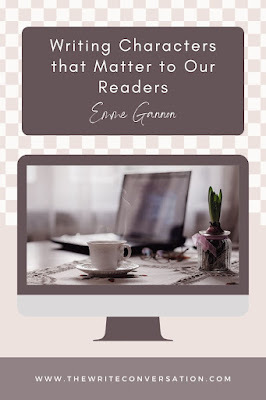
Published on July 15, 2022 22:00



